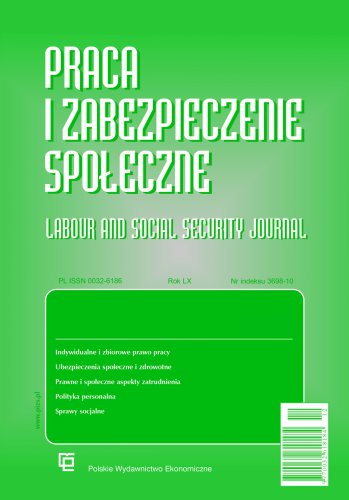For the unification of the research on the provision of Article 210 para. 5 of the Polish Labour Code and other exclusive legal regulations similar to it
"Aporia" is definied as the problem which, despite of the correct reasoning, it is hard to solve at current state of knowledge. Does it really have to be characterized by a very high aporeticy (in the light of contemporary legal culture) a dilemma emerging under Article 210 para. 5 of the Polish Labour Code (LC)? This legal provision excludes, in relations to the category of the employee indicated in it, an application of the provisions Article 210(1) and Article 210(2) of the LC, which relate to the right of the worker to remove himself from. among other things, existing to this employee danger for life or health at work. This question appears also within the confines the other regulations, presented as a examples in this article, in which legislator as well makes analogous "legal exclusion" (subjective exclusion or rather subjective-objective exclusion). Maybe, valuable and lasting effects can be achieved by an attempt to provide scientific, unified, non-casuistic approach to relevant issues,according to a common general standard, in relation to every category of the workers, not only to employees, and in relation not only to "rescuing" indicated in Article 210(5) of the LC, but also to other work designated to the protection of the specific legal goods, and valued equally high.
References
Bibliografia/References
Amnesty International (2020). Exposed, silenced, attacked: Failures to protect health and essential workers during the COVID-19 pandemic. London.
Bogdanowicz, M. (2020). Wywiad udzielony A. Szczepańskiej. Nie można odmawiać medykom praw wynikających z konstytucji. Dziennik Gazeta Prawna z 28.05.2020, s. B10.
Bury, B. (2016). Prawo personelu medycznego (lekarskiego) do powstrzymania się od wykonywania pracy. Monitor Prawa Pracy, (4).
ILO (2019). Guidelines on decent work in public emergency services. Geneva.
Jankowiak, J. (1997). Prawo powstrzymania się od wykonywania niebezpiecznej pracy przez pracowników obowiązanych do ratowania życia ludzkiego lub mienia (art. 210 § 5 k.p.). Ruch Prawniczy, Socjologiczny i Ekonomiczny, (4).
Michalak-Królicka, J. (2020). W szpitalu etatowiec w trudniejszej sytuacji niż kontraktowiec. Wydawnictwo WoltersKluwer. www.prawo.pl
Radé, Ch. (2009). Cass. soc. 28 janvier 2009, n° 07-44.556. www.lexbase.fr.
WHO (2020). Coronavirus disease (COVID-19) outbreak: rights, roles and responsibilities of health workers, including key considerations for occupational safety and health, interim guidance. Geneva.
WHO, ILO (2018). Occupational safety and health in public health emergencies. Geneva.
Wyka, T. (2012). Komentarz do art. 207 k.p., pkt 11. W: K. W. Baran (red.), Kodeks pracy. Komentarz. Warszawa.

